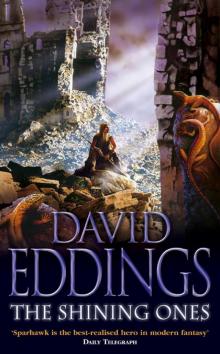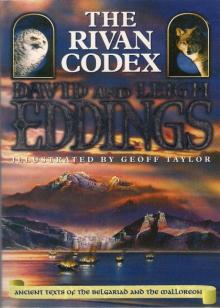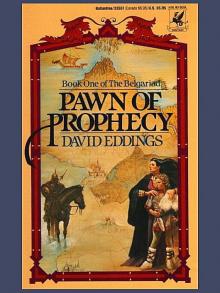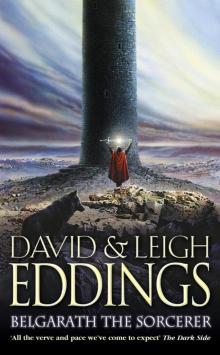- Home
- David Eddings
The Elder Gods Page 26
The Elder Gods Read online
Page 26
Narasan shook his head. “No, Sorgan, our job is getting up to the head of the ravine before the enemy sends people here to replace all the ones that were drowned in the flood. If we can hold our ground at the head of the ravine, no enemies will ever get this far downstream.”
“Maybe,” Sorgan conceded, “but Longbow says that the enemies are very sneaky, and I don’t like surprises. I think we’ll all sleep a lot better if we know that we’ve got a safe place to hole up if things go to pot.”
“Would it be all right if I suggested a compromise, sirs?” Keselo asked them.
“We’ll listen, Keselo,” Commander Narasan agreed.
“Red-Beard’s model showed a narrow gap at the very head of the ravine. If we were to send a sizeable advance force up there at a fast march, we should be able to block off that gap within three or four days. In the meantime, we could put a goodly number of men to work building a temporary barricade across the ravine about a mile upstream from these more permanent forts—just in case the enemy’s already got people coming down toward Lattash. Of course, if that’s the case, our advance force won’t have much chance of reaching the gap anyway, and the barricade would give them some cover in an emergency.”
“This young fellow spoils a lot of good arguments, doesn’t he?” Sorgan suggested. “You and I could have yelled at each other for quite a while, Narasan, and now Keselo just took all the fun out of it.”
“Ah, well,” Commander Narasan said with mock regret, “nobody’s perfect, I guess.”
“I’ll peel off a fair number of my men to set up the barricade,” Sorgan added. “Logs aren’t quite as solid as boulders, but they’ll probably keep the snake-men back—particularly if we line the front with sharp stakes dipped in poison. I noticed down at Lattash that the snake-men that got drowned weren’t wearing any shoes or boots, and walking barefoot across a field of poisoned stakes wouldn’t be a good way to get any older, would it?”
“I’ll make a special point of not doing that, Sorgan,” Commander Narasan promised with a perfectly straight face.
About midmorning the following day, Keselo and Rabbit were a short distance in front of the main army, and Rabbit suddenly stopped. “Is that a village over there on the other side of the river?” he asked.
“Where?” Keselo asked his little friend.
“Up near the top of the ravine, under that rock overhang.” Rabbit pointed.
Keselo peered across the river. There appeared to be structures of some kind under the overhanging rock. “Ah,” he said. “It’s abandoned. We come across ancient ruins all the time down in the Empire. They’re places where people used to live, but nobody’s ever been able to come up with a reason for just exactly why everybody who lived there just packed up and left.”
“Maybe they didn’t, Keselo. There might have been a war or a pestilence that killed them all off.”
“That’s possible, I suppose. Those ruins across the river appear to be quite a bit more sophisticated than the houses down in Lattash. If we weren’t so busy, it might be sort of interesting to explore that place.”
“It doesn’t interest me enough to make me want to swim across the river to get there,” Rabbit said flatly.
Longbow had been up on the rim of the ravine, but he came down to the north bench late that afternoon. “It seems that the servants of the Vlagh were all washed down the river during the flood,” he reported to Sorgan. “We haven’t seen a single one yet.”
“Maybe they’re hiding in the bushes,” Sorgan suggested.
Longbow shook his head. “Not from me, they aren’t. I’ve been hunting them for many, many years, and if there were any of them in the ravine, I’d have seen them. I’ve seen a few deer, but no enemies.”
“They aren’t any too bright, then, are they?” Rabbit said. “Didn’t they know how dangerous it was to sit alongside that river when the snow started to melt?”
“They live in a desert, Rabbit,” Longbow replied. “Water’s very rare in the Wasteland.” He turned to Sorgan. “It won’t hurt to take a few precautions,” he advised, “but I’m fairly sure that the ravine is clear. We’ll keep watch from up on the rim of the ravine, and we’ll warn you if we see any of the Vlagh’s servants. Your army—and Narasan’s—should be able to reach the head of the ravine without any problems.”
“That was the only shaky part of our whole scheme,” Sorgan noted. “If Narasan and I can reach the head of the ravine before that Vlagh thing can get any replacements here, we’ll have just won us a war.”
“That was sort of what we had in mind,” Longbow said mildly.
As evening settled over the scattered, disorganized camp of the Maags, Keselo moved out of the firelight to put some distance between himself and the rowdy pirates.
“What seems to be the problem, Keselo?” Longbow’s voice came out of the darkness.
Without even thinking, Keselo reached for his sword hilt.
“Don’t do that,” Longbow chided him.
“You startled me, that’s all,” Keselo apologized.
“There’s something bothering you, isn’t there?”
“This all seems so unnatural,” Keselo admitted. “I’m not used to fighting battles in the deep forest like this. There aren’t any roads, and the trees make it impossible for me to see anything that’s more than five feet away.”
“The enemies can’t see you either, Keselo. When night falls, everybody is invisible. There’s something that goes just a little deeper, though, isn’t there?”
“I’m afraid,” Keselo blurted out the admission. “I’ve always been afraid of snakes, and now I’m facing the prospect of fighting enemies that are part people and part snake. What sort of weapons can I possibly use to defend myself?”
“You already have the weapon, Keselo. It’s called your mind. The servants of the Vlagh have very little in the way of minds. The Vlagh doesn’t encourage that. It wants to do all of the thinking. I do know quite a bit about them, but sometimes their stupidity even surprises me. The only weapons they have are parts of their bodies, so they don’t even realize what a sword or a spear or a bow is. I once killed thirteen of them in a single place. I’d have killed more, but I ran out of arrows. The ones who were still living just stood there—wondering why the others were all falling down, probably.”
“You’re not serious!” Keselo exclaimed.
“Oh, yes. Always remember what One-Who-Heals said back in Zelana’s cave: The servants of the Vlagh aren’t intelligent enough to be afraid. If the Vlagh tells a thousand of them to attack, the last one that’s still alive will continue to attack until you kill it as well. The death of all its fellows will have no meaning for it. The creatures of the Wasteland don’t realize that every living thing dies eventually, so they’re not aware of the fact that they won’t live forever. They always seem to be surprised when death overtakes them.”
“They aren’t very big, are they?” Keselo asked.
“Very small—even smaller than Rabbit—but they’re very quick.” Longbow smiled faintly. “Try not to waste the poison on your sword tip. A small jab anyplace on their bodies will kill them almost instantly. You don’t have to drive your sword completely through them.”
“Now I’ll have to learn how to use my sword all over again,” Keselo said ruefully.
Longbow reached out and tapped Keselo’s iron breastplate with one knuckle. “This should prove quite useful,” he observed. “After one of them breaks off its fangs and the spurs on its arms on your iron shirt, it won’t be dangerous anymore.”
They moved farther and farther up the ravine for the next several days, and the pirate Hook-Beak kept Keselo busy maintaining contact with Commander Narasan. The fact that as yet there had been no contact with enemy forces seemed to make both Sorgan and Narasan more than a little edgy. Keselo noticed that Hook-Beak had started to carry his long spear in both hands rather than resting it on his shoulder, and the rest of the crew of the Seagull soon followed his example.
&nbs
p; As they moved on up the ravine, Keselo noticed that the trees were thinning out and the underbrush wasn’t quite as dense. He definitely approved of that. If the forest thinned out a bit more, things might be more normal. The notion of venomous enemies lurking in thick brush all around him had made him very jumpy. As his nerves settled down, his curiosity began to mount, though. “This doesn’t look at all like the lower part of the ravine, Longbow,” he said to his friend one afternoon. “What happened to the trees and undergrowth up here?”
“Fire, probably,” Longbow replied. “If a dry summer comes along, all it takes to set the forest on fire is a lightning strike. Then, too, we’re quite a bit higher up in the mountains now, and the higher you go, the shorter the growing season is. That tends to stunt the trees and bushes.”
“I know that you’re very fond of the deep woods, my friend,” Keselo said, “but I’m much more comfortable with open space around me. Now that I can see more than ten feet, certain anxieties that were bothering me are starting to go away.”
“I’m so happy for you,” Longbow said with a faint smile.
On the morning of their sixth day out from Lattash, Hook-Beak sent scouts on ahead toward the clearly visible gap at the head of the ravine.
“Maybe the snake-men who got drowned in that flood was their whole army, Cap’n,” Ox suggested about noon. “Longbow ain’t seen no survivors yet.”
“If that’s all there were, Lady Zelana wouldn’t have gone to all the trouble and expense of hiring us, Ox,” Sorgan disagreed. “There’s got to be more enemies somewhere.”
Then Keselo looked on up the bench toward the head of the ravine, and he saw Rabbit running toward them as fast as he could. It was easy to see at that point how the little Maag had got his name.
He was gasping for breath when he reached them. “We seen ’em, Cap’n!” he wheezed.
“Where?” Hook-Beak demanded sharply.
“They’re still a good ways off,” Rabbit replied. “Longbow was up there just on this side of the gap. He told us to keep low, and then we went on up. There’s a big, flat plain on the other side, but it’s way down below, and there’s a slope that leads right up to the gap. The enemy soldiers are gathering at the foot of the slope.”
“How many?” Ox demanded, tightening his fist around the handle of his heavy battle-axe.
“I can’t count that high, Ox,” Rabbit confessed, “but I think we might be in a whole lot of trouble.”
2
Hold the men right here, Ox,” Sorgan commanded. “We don’t want a whole crowd up there just yet.”
“Aye, Cap’n,” Ox replied.
Then Sorgan and Keselo followed Rabbit on up to the head of the ravine. The river there was a narrow trickle of sparkling water that seemed almost to giggle its way over the stones. The trees were stunted here, and there were still a few patches of dirty snow back under their sheltering limbs. The air was clean, and Keselo could see for miles and miles out over the mountains of Western Dhrall.
Commander Narasan had evidently just reached the head of the ravine. He’d removed his iron helmet, and he and Longbow were quietly talking near the narrow gap that marked the head of the ravine.
“Rabbit tells us that we’ve finally located some snake-men,” Hook-Beak said.
“Just a bit more than ‘some,’ Sorgan,” Narasan replied glumly. “I think we’re going to be working for short pay this time out.”
“That’s what Rabbit told us. Are there really that many?”
“Come and look,” Longbow said. He turned and led the way up toward the narrow gap between two tall peaks. Keselo saw that his commander had been right. The gap would be a perfect place to erect a fort. No more than a few of their enemies could attack at any one time.
They passed on through the gap, and Keselo stopped and stared in awe at the rock-strewn sea of sand and rock lying a thousand feet below and stretching on out to the eastern horizon. It wasn’t just empty desert, however. A horde of tiny figures was coming across the barren land to the east, and the horde stretched across the Wasteland from horizon to horizon.
“It’s easy to see why the people who live there would rather find a more pleasant place to set up shop,” Commander Narasan observed. “I can’t for the life of me see how they manage to survive out there.”
“It’s a bit bleak,” Sorgan agreed. “The next question is how are we going to keep them from resettling in Lady Zelana’s part of the country?”
“Don’t rush me,” the commander said. “I’m working on it.”
Keselo had been staring down the slope, and he saw what appeared to be faint ridges that were far too evenly spaced to be the result of ordinary wind and weather. Idly he scuffed at the sand at the top of the slope with his boot. The rock beneath the sand was flat, and there appeared to be a straight edge where that rock butted up against the one beside it. He kicked away more sand. There seemed to be a straight line of squared-off rocks at the front of the gap. He dropped to his knees and pushed the sand away from the front of the flat rocks he’d just exposed. About a foot down, he came to another line of flat rocks. He raised his head and stared down the long slope. “That’s impossible!” he exclaimed.
“What’s impossible, Keselo?” Commander Narasan asked.
“I don’t think this slope is any sort of natural formation, sir,” Keselo replied. “It looks to me as if it might just be a stairway.”
“You’re not serious!” the commander scoffed.
“Look for yourself, sir,”
They all began clearing sand away at that point, and more and more stone steps were exposed. “If this goes all the way down to the desert floor, it would have taken an army centuries to build it,” Narasan said in an awed voice.
“The Vlagh’s very patient,” Longbow told him. “This is the lowest place in the wall that separates the Wasteland from the Domain of Zelana, so if the Vlagh was thinking about paying us a call, it needed some way for its army to reach the top of the ravine—a way that wind and weather and time couldn’t destroy. I’d say that this invasion’s been in the works for a long, long time.”
“Well, that’s just too bad,” Sorgan said with a broad grin. “They might have built this silly stairway, but we’ll tear it apart. Life’s going to get very exciting for anybody who tries to come up the stairs when we start rolling blocks down.”
“Let’s not be too hasty here, Sorgan,” Narasan said. He went a short distance down the stairs, kicking dirt off the steps as he went and stopping every so often to turn and look back up at the gap. “It’d be a shame to waste all this perfectly good building material, don’t you think? This stairway’s at least four or five times wider than the gap, so there’d be enough stone blocks to build an even bigger fort than I’d originally intended. I wasn’t really thinking about anything much higher than an ordinary barricade. Now that we’ve got all these building blocks, though, I should be able to block off the gap completely. That would give the enemies a pretty stone wall to look at while they’re charging up the stairway. I rather think they’ll get the message, don’t you?”
“They should,” Sorgan agreed, “particularly if we leave little holes in the wall to poke our spears through if they try to climb up over it. Are your people any good at building? My cousin Skell’s got every Maag in the fleet who knows the least bit about that sort of thing working on the forts near the bottom of the ravine.”
Narasan came back up the stairs. “Trogite soldiers spend more time building fortifications than they do fighting, Sorgan. If your men tear the stairway apart and carry the blocks up to the gap, my men can put the fort together in short order. Our advance forces should be joining us before the day’s out, so we’ve got time to work out the details.”
Something occurred to Keselo. “Excuse me,” he said politely. “Wouldn’t it be better if the enemies down below can’t see what we’re doing up here?”
“Do all the work at night, you mean?” Sorgan asked.
“Well, no, not rea
lly,” Keselo replied. “The prevailing wind comes up the ravine from the west, and smoke goes where the wind takes it. A few bonfires with fresh evergreen boughs piled on top of them would put out enough smoke to conceal us from the enemy down below, wouldn’t you say?”
“It would, wouldn’t it?” Hook-Beak mused. “This is a very clever young man you’ve got here, Narasan.”
“He earns his pay,” Narasan agreed.
“It comes with being a sailor,” Rabbit explained the next morning when Keselo noted how smoothly the Maags were taking the top of the stairway apart and passing the stone blocks from man to man. “A ship’s crew learns early that they’ve got to cooperate. We row the ship when the wind’s not right, and the ship won’t go anywhere if the oars aren’t working in unison, and when we raise the sail, we have to pull together.” He looked down at the Maags working just below the gap and then over at the steadily growing stacks of building blocks behind the gap. “If every Maag working on this just picked up a block and carried it all the way to those stacks, they’d be falling all over each other.”
“They would, wouldn’t they?” Keselo agreed.
It was about midafternoon when Ox came up the center portion of the stairway the Maags were leaving intact to facilitate the chore of passing the stone blocks up to the gap. “You want we should put on a fresh crew and work on through the night, Cap’n?” he called up to Hook-Beak. “Those bonfires should put out a fair amount of light, so we’ll be able to see what we’re doing after it gets dark.”
“We might as well, I guess,” Hook-Beak agreed. “The sooner we get all those blocks up here, the sooner the Trogites can start building the front wall of the fort.”
“Do you people actually work after the sun goes down?” the balding Gunda demanded incredulously.
“When you’re out at sea, you almost have to keep working,” Sorgan replied. “The tides and wind don’t stop just because the sun goes down.” He looked over at Narasan. “It’s something to think about, you know,” he said. “The rest of our people—both yours and mine—should be joining us tomorrow, so we’ll have fresh men to take over the chores. If we both put fresh men to work on this even after it gets dark, we’ll be able to finish up in half the time it’d take if we only work when the sun’s out.”

 The Losers
The Losers The Ruby Knight
The Ruby Knight The Sapphire Rose
The Sapphire Rose King of the Murgos
King of the Murgos The Seeress of Kell
The Seeress of Kell Demon Lord of Karanda
Demon Lord of Karanda Pawn of Prophecy
Pawn of Prophecy Queen of Sorcery
Queen of Sorcery Castle of Wizardry
Castle of Wizardry Guardians of the West
Guardians of the West Sorceress of Darshiva
Sorceress of Darshiva The Shining Ones
The Shining Ones Enchanters' End Game
Enchanters' End Game Magician's Gambit
Magician's Gambit High Hunt
High Hunt The Hidden City
The Hidden City The Rivan Codex
The Rivan Codex Regina's Song
Regina's Song The Elder Gods
The Elder Gods The Malloreon: Book 02 - King of the Murgos
The Malloreon: Book 02 - King of the Murgos The Malloreon: Book 05 - Seeress of Kell
The Malloreon: Book 05 - Seeress of Kell Treasured One
Treasured One The Malloreon: Book 04 - Sorceress of Darshiva
The Malloreon: Book 04 - Sorceress of Darshiva The Malloreon: Book 03 - Demon Lord Of Karanda
The Malloreon: Book 03 - Demon Lord Of Karanda Belgarath the Sorcerer and Polgara the Sorceress
Belgarath the Sorcerer and Polgara the Sorceress The Malloreon: Book 01 - Guardians of the West
The Malloreon: Book 01 - Guardians of the West The Treasured One
The Treasured One Pawn of Prophecy tb-1
Pawn of Prophecy tb-1 Polgara the Sorceress
Polgara the Sorceress Belgarath the Sorcerer
Belgarath the Sorcerer The Younger Gods
The Younger Gods Crystal Gorge
Crystal Gorge